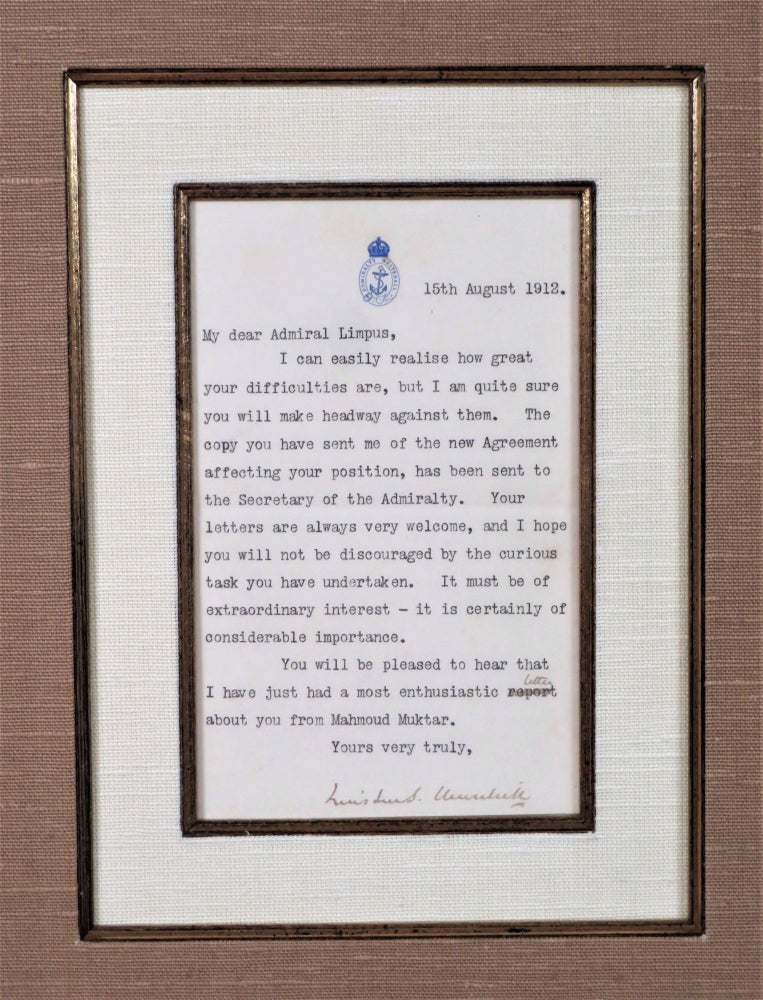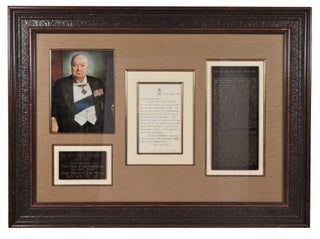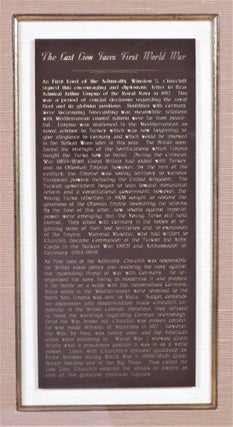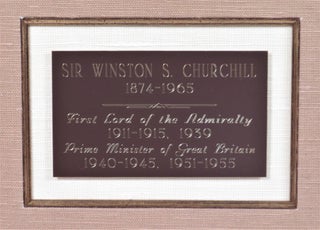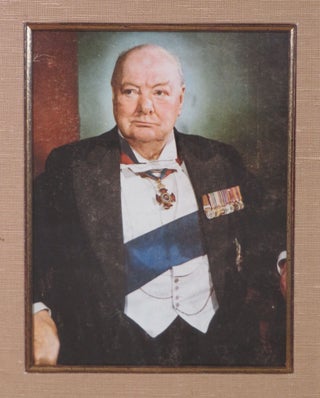A handsomely framed 15 August 1912 typed, hand-emended, and signed letter from then-First Lord of the Admiralty Winston S. Churchill to his newly-appointed Naval Advisor to the Ottoman Empire, British Rear-Admiral Arthur Limpus
Admiralty House, London: 1912. Letter. This handsomely framed item features a typed, hand-emended, and signed 15 August 1912 letter from then-First Lord of the Admiralty Winston S. Churchill on his Admiralty stationery to his newly-appointed Naval Advisor to the Turkish Navy, British Rear-Admiral Arthur Limpus. The letter encapsulates Churchill’s expectations and ambitions regarding the Ottoman Empire, which would nearly cost Churchill both his political and corporeal lives during the First World War.
The letter anchors a multi-item display, framed at the center in double-matted tan and white linen, with each recess trimmed in gilt. Flanking the letter, likewise recessed are (to the right) a 431-word didactic titled “The Last Lion Faces First World War” engraved on dark bronze supplying a tidy overview of the historical context surrounding the letter. To the lower left, a matching dark bronze engraved placard reads “SIR WINSTON S. CHURCHILL | 1874-1965 | First Lord of the Admiralty | 1911-1915, 1939 | Prime Minister of Great Britain | 1940-1945, 1951-1955.” At the upper left is a color portrait of Churchill on metal which appears almost certainly to have been extracted from the lid of a circa 1965 special issue illustrated United Biscuits tin (see Douglas Hall, p.20), the aesthetic effect being more pleasing than the humble origins might suggest. The elaborately carved 2.75 inch (7 cm) wide thick brown wood frame measures 31.5 x 23.25 inches (80 x 59 cm), glazed with UV-filtering acrylic.
The letter is dated 15 August 1912, and reads, “My dear Admiral Limpus, I can easily realise how great | your difficulties are, but I am quite sure | you will make headway against them. The | copy you have sent me of the new Agreement | affecting your position, has been sent to | the Secretary of the Admiralty. Your | letters are always welcome, and I hope | you will not be discouraged by the curious | task you have undertaken. It must be of | extraordinary interest – it is certainly of | considerable importance. | You will be pleased to hear that | I have just had a most enthusiastic letter | about you from Mahmoud Muktar. | Yours very truly,” Referring to the correspondence from Mahmoud Muktar, the letter features the typed word “report” crossed out and replaced with “letter” in the same ink as the letter is signed “Winston S. Churchill”.
Arthur Henry Limpus (1863-1931) entered the British Navy in 1876 and served much of his early career in the Mediterranean. Limpus came to the attention of Churchill during the 1900 relief of Ladysmith during the Second Boer War. Limpus, then an officer in the Naval Brigades, played a role in the inventive and intrepid effort to bring ship’s guns overland to attack the Boers' heavy gun emplacements and to provide artillery barrage to cover advancing British infantry. Limpus’s actions saw him promoted to Captain. Churchill’s own actions during the conflict made him a celebrity and helped launch his political career.
A little more than a decade later, by 1911, Churchill had become First Lord of the Admiralty and Limpus a rear-admiral. The next year, in May 1912 – three months before he wrote this letter to Limpus - Churchill appointed Limpus to head the British naval mission to the Ottoman Empire. Limpus was made a vice-admiral in the Turkish Navy and, in anticipation of the coming war with Germany, tasked with convincing the Ottoman Turks to ally with British interests over those of Germany.
This letter is clearly written at the beginning of Limpus’s vital embassy. On the same day he wrote this letter to Limpus, Churchill wrote to his counterpart in the Ottoman Government, Navy Minister Mahmud Muhtar Pasha (1867-1935), who is referred to by Churchill as “Mahmoud Muktar”. Churchill wrote of Limpus “I took the greatest personal trouble in selecting Admiral Limpus for service with the Turkish Navy, as I was anxious that you should have at your disposal an officer who would do credit to the reputation of the British Navy… I first made his acquaintance 12 years ago in South Africa, where he played a distinguished part. He is a sincere and thoroughly competent officer…”
Likely Limpus could have done little to counter the historic forces that led to Ottoman alignment with Germany in the First World War. Nonetheless, Limpus’s alleged competence seems to have been both overestimated and oversold by Churchill. Limpus reported to Churchill on 3 December 1913, saying “It may fairly be said that something tangible has been done, and a success scored which should retain a predominant British interest here in naval affairs for many—probably 30 years.” Eight months later, on 2 August 1914 the Ottoman government signed a treaty of alliance with Germany. Limpus became Superintendent of the Malta Dockyard.
It appears that the unfortunate Limpus’s command of English was no better than his assessment of the prospects for Anglo-Turkish alliance. A 10 December 1913 letter from Limpus drew from Churchill a scathing, detailed criticism of “the general style and presentment” of Limpus’s letters, which Churchill characterized as “mere jottings of passing impressions hurriedly put together without sequence, and very often with marked confusion…”
The Ottoman Turks proved at least as much of a miscalculation and career challenge for Churchill as they had been for Limpus. First Lord of the Admiralty from 1911 until 1915, Churchill’s career was derailed by the disastrous Dardanelles offensive and slaughter at Gallipoli. Scapegoated and forced to resign, Churchill went from the Cabinet to the Front. He spent political exile as a lieutenant colonel of a battalion in the trenches. Before war's end, Churchill was exonerated and rejoined the Government, but despite his political recovery, the stigma of the Dardanelles lingered. Item #006579
Price: $6,500.00

